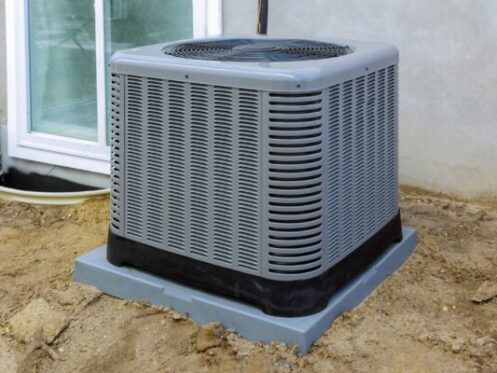When investing in an air conditioning system for the home, the sheer volume of choices may overwhelm you. Which system is right for you? In addition to checking out the various brands and price points, you must determine the best size of AC system for your residence. Our team at Comfort Heating & Air Conditioning, LLC can help you with that. Here’s what we look at.
- Square Footage
- Ceiling Height
- Home Insulation
- Climate and Sun Exposure
- Embracing Different Measuring Systems
- Calling Us Before You Buy a Unit Saves You Money
Square Footage
Your home’s size is the most important consideration when determining the right size for your AC system. The larger your home is, the larger the AC system has to be to keep it cool. Do you know your home’s square footage? If you don’t, there’s an easy trick to figure it out. Measure the lengths and widths of all rooms. Next, multiply them together. For example, for a room that’s 10 feet long and 20 feet wide, multiply 10 x 20. The result is 200, which is the square footage of the room. Next, add up all the square footage results from all the rooms to get the home’s overall size.
Ceiling Height
Do you have cathedral ceilings? The height of your ceilings impacts the size of the AC system you should consider. High ceilings require more cooling power to keep the space comfortable. Standard ceilings do not factor into the AC system’s size calculations.
Home Insulation
Your home’s insulation can impact the AC system’s operation and size requirement. A well-insulated home such as you typically see with newer construction will demand less cooling power than a poorly insulated one. Insulation helps keep the cool air inside the living space, prevents it from escaping to the outside, and therefore does not make the AC system work harder. However, don’t just focus on the walls’ insulation. Factor in the ceiling insulation, too! Another way that cool air could be lost is the quality of the windows. Older windows tend to leak air, while new models typically don’t.
Climate and Sun Exposure
We also look at the climate. As you might imagine, areas with moderate climates put little added strain on the AC. Hot and humid climates make keeping your home consistently cool much more difficult. However, we also have to look at sun exposure. The amount of sun exposure your home receives can impact the size of the AC system you will need. A structure with a lot of direct sunlight needs more cooling power than a mostly shaded home. So, if you have tall trees around your home, you’ll need a different type of air conditioning unit than your neighbor with a treeless lot.
Embracing Different Measuring Systems
BTU is short for British Thermal Unit. In the HVAC industry, BTU statements tell you how much hot air the appliance can remove from your home in one hour. Generally, you need 20 BTU for every square foot of living space. In the room example from earlier, you would multiply 200 square feet by 20 BTUs, meaning you would need 4,000 BTUs for the room. However, you may also see measurements in tons. One ton equals 12,000 BTUs.
Remember that these formulas give you an estimate of the AC system size you’ll most likely need. However, that estimate doesn’t account for door openings, window insulation, or tree shade. These are considerations that our technicians can make for your location.
Calling Us Before You Buy a Unit Saves You Money
It’s tempting to buy a unit that’s on sale. However, bigger isn’t always better in home air conditioning. A unit that’s chosen simply because it’s inexpensive can easily cost you a lot more in daily operations. Installing an air conditioning unit that is too small will cause the unit to have a challenge keeping your home cool. You’ll notice that some areas will be cooler than others. You might also have to deal with spots of higher humidity in the home. As you can imagine, working harder causes the appliance to wear out sooner.
That said, a unit that’s too big will likely also create cold spots in the home. And, since the unit will cycle on and off frequently, you’re looking at wasted energy and higher utility bills. At Comfort Heating & Air Conditioning, LLC, we help our neighbors find the AC system that is just right for the space that needs cooling. Besides traditional air conditioning units, we also deal with mini-split systems and heating systems. That includes installation, repair, and maintenance. You can also turn to us for indoor air quality assessment, fireplaces, thermostats, and more Call us today to discuss your needs or schedule an appointment in Billings or a surrounding area.


